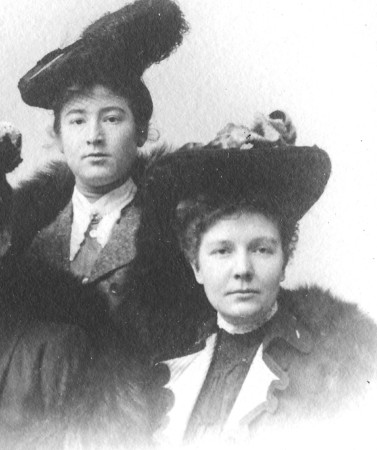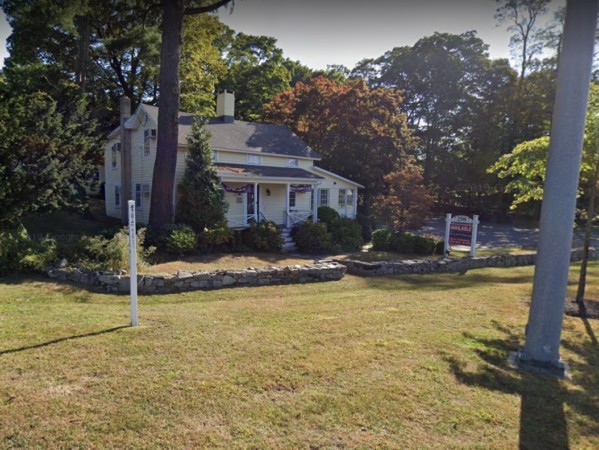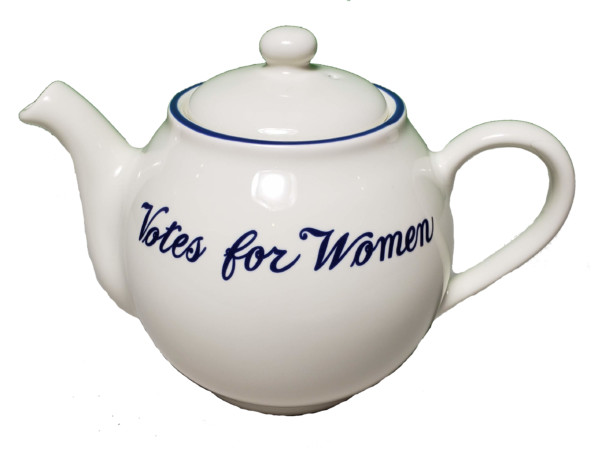Grassroots Activism: Tea Rooms to the Ballot Box
With its high caffeine content, sugary finish (depending on one’s tastes), and reputation for promoting conviviality, tea has long been a popular stimulant when mixing social and business concerns. Served with dainty sandwiches, pastries, and cakes, tea in fact has a revolutionary place in the history of women’s suffrage.
When Lucretia Mott and Elizabeth Cady Stanton met with other women in 1848 to plan the Seneca Falls Convention, they did so over tea. At that meeting, Stanton “poured out . . . the torrent of [her] long-accumulating discontent” along with her oolong (or Earl Grey). The result was the symbolic and practical start of the women’s suffrage movement in the United States.
A major advantage of tea parties was how innocent and ordinary they seemed to the uninvited. Afternoon tea provided an ideal excuse for women to meet, talk, and plan in private, and without disapproving male supervision. Even if suffragist teas attracted negative attention, the very format of these meetings tended to deflect criticism. How much trouble could a group of women, sipping tea and sampling delicacies made by their own hands, really be? Of course, the subterfuge of the suffragist tea party did not last long. As soon as women began presenting petitions to congressmen and giving public speeches, it became clear to everyone that tea was an important affair after all.
Tea continued to act as a social and business mixer for suffragists in the later 1800s, but it was now being served to its greatest effect in women’s clubs. Women’s clubs exploded in popularity from the 1870s onward, organizing around social interests and progressive causes such as civic improvement, temperance, child labor, family planning, and education. Even older, non-issue oriented clubs became involved. For Hannah Ambler and her sister Elizabeth Raymond, for example, tea was a staple of DAR meetings in Norwalk. Meanwhile, the Woman’s Exchange operated by the Woman’s Central Association in the 1890s, also in Norwalk, sold “dainty cookery” to be consumed with tea or as dessert. The Association also maintained a parlor at their headquarters, where members could drink tea and socialize after club events.
Perhaps the most important function of tea for the suffragists in the early 1900s was as a fundraiser and advertiser for their cause. In California, for example, suffragists developed and marketed Equality Tea, which the Woman’s Suffrage Party of California served in their own charity tearoom and consumers could buy directly from their grocers. Here in Wilton, suffragists Ethel Betts Weston and Abigail Rundel operated a tearoom at 250 Danbury Road, a small yellow house just south of the Wilton Baptist Church. Their success inspired the Wilton Equal Franchise League, of which both women were members, to take over the tearoom by 1916.
League women took turns hosting the tearoom, which was open daily during the summer and on Friday afternoons in the winter. Tea was 15 cents a cup, or 25 cents when fundraising for “some special benefit” such as the Red Cross. They also sold cakes and nutbreads. The Wilton Equal Franchise League also used the tearoom for Rose Teas. Suffragists used yellow roses, symbolizing support for their movement, to decorate at Rose Teas. Sympathetic customers bought the roses to sport on their lapels in public support of the cause.
Tactics like Rose Teas were shared widely among suffragists, who learned from one another how to organize and run their local suffrage leagues, how to effectively advocate for their cause, and how to fundraise. Of course, with so many “club women” joining the suffrage movement, many were already experts in these matters. Abigail Rundel, for example, had long been active in the Wilton Library Association, while Grace Schenck, founder of the Wilton Equal Franchise League, had experience as a leader in professional nursing associations. The Wilton Equal Franchise League nevertheless had particularly close ties to the Norwalk Equal Franchise League, which provided popular suffrage speakers to Wilton like the Hill sisters and Norwalk librarian Dothea Stone Pinneo, and gave invaluable advice and practical support from the beginning.




